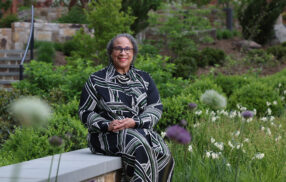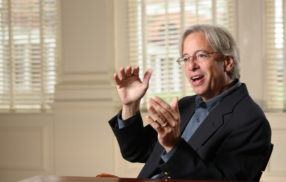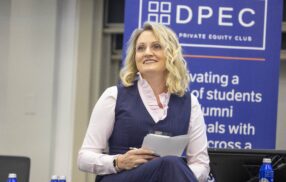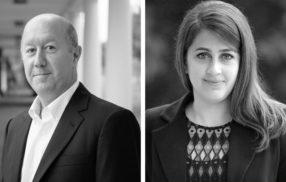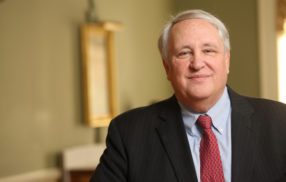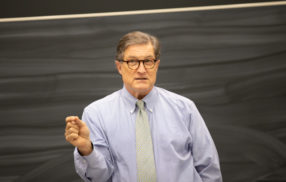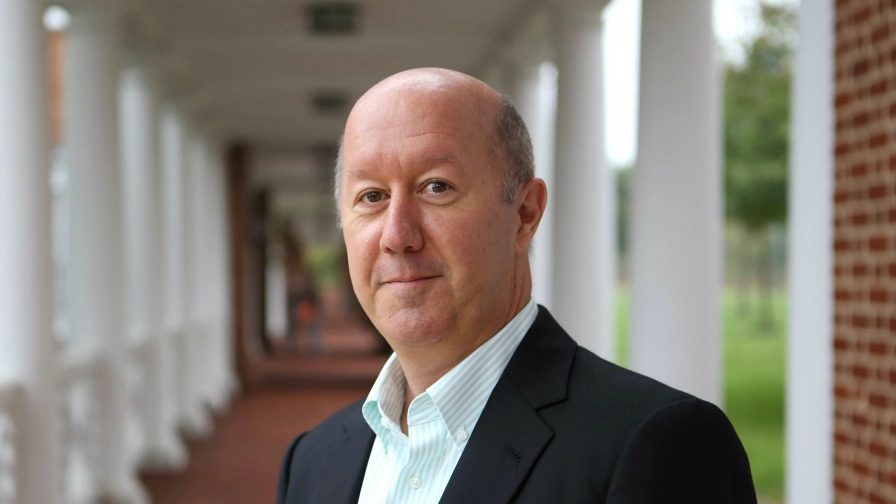
UVA Darden Professor Accepts Visiting Scholar Position at Federal Reserve
By Dave Hendrick
University of Virginia Darden School of Business Professor Frank Warnock has accepted a new appointment at the Board of Governors of the Federal Reserve System, bolstering the research capabilities of the body’s International Finance Division.
For Warnock, who will continue all of his roles and responsibilities at Darden as professor in the Global Economies and Markets area, the position with the Federal Reserve represents a return to his professional roots, as the economist spent six years working on international capital flows issues at the Fed after completing his Ph.D.
“While I owe a lot to my Ph.D. mentor at UNC, Stanley Black, the Fed is where I truly learned how to be an economist,” said Warnock, who will spend his time in the new role as a visiting scholar. “It’s an amazing institution where everyone works together to do the right thing and better understand important issues as they form monetary policy.”
Warnock credits numerous mentors at the Fed in shaping his career path and approach. Said Warnock, “Jon Faust and Dale Henderson did much to help me think like a researcher; Karen Johnson and Vince Reinhart convinced me, as much in actions as words, that my research was meaningful; and to this day I use management techniques used by my former section heads, Bill Helkie and Charlie Thomas.”
Warnock welcomes the opportunity to aid a new generation of economists grappling with some of the world’s most pressing challenges. In his new position, he will focus on research related to international financial markets, market participants and capital flows. He will also serve as a sounding board for developing research strategies by providing individual advice through meetings with economists. In addition to his roles helping to shepherd individual economists’ research, Warnock takes a special interest in research using the Treasury International Capital (TIC) program — the U.S. government’s source of data on capital flows into and out of the country — and will consult on how to best promote to outside researchers the wealth of information contained in the TIC data.
“Frank brings a wealth of experience working in the areas of international finance and capital flows, and a stellar record of high-quality research,” said Beth Anne Wilson, director of the Division of International Finance. “We are very lucky to have him working with our staff, especially new economists who are just starting out in their research careers.”
If the Fed taught Warnock how to be an economist, he honed and expanded his subject matter expertise at Darden, where he has taught since 2004 and won numerous teaching and research awards. Warnock currently leads the second half of the core Global Economies and Markets course and teaches the “Global Financial Markets” and “Transforming Societies” electives.
While he has authored or coauthored dozens of papers during his Darden career, the appointment allows Warnock to benefit from full engagement with the world of research while advising the Fed’s team of economists.
Warnock’s work will not overlap with the Fed’s policy-making activities. Instead, helping the economists make the most of their research will be the chief goal, though the research may eventually inform or influence Fed action.
“There are a number of big issues in international finance that directly impact and inform what the Fed does,” said Warnock. “We’ll explore all of them.”
Warnock’s appointment was put into motion before the onset of the coronavirus pandemic. Once the pandemic started, there was question whether his reengagement with the Fed should be postponed until the institution was again operating fully in-person. But the Darden professor said the Fed is deliberate in pushing ahead with its research capabilities, even as many employees are juggling working from home and often taking on an outsized role in childcare.
Mindful of the added responsibility so many — especially female economists — are taking on outside of their professional roles, Warnock said he makes himself available as-needed and has devised “low-cost” opportunities for engagement in the pandemic era.
For example, Warnock organizes informal reading groups on the discussion of key recent papers in international finance and asks the readers to be prepared to discuss four simple questions:
- Why, according to the author, is the paper important?
- What is the analysis?
- Did the authors deliver on their stated planned contribution?
- What are the opportunities to move the research forward?
Framing the discussions this way can assist newer economists, especially, in seeing how their own work could be structured or furthered and what role it plays in the big picture.
“Economists who just arrive at the Fed are excellent in execution but sometimes don’t step out of their comfort zone and forcefully put forward what the world should learn from their research,” said Warnock. “What I learned when I left the Fed for Darden is that the rest of the profession starts with what the world should learn from their research and then attempts to fill in the details later. Just getting newer Fed economists to think more about reaching — I often use the word “respecting” — the outside audience is progress. In addition, we’re considering some of the best papers in international finance, and when Fed economists unpack and discuss them and consider areas for improvement, they are empowered.”
Recent reading groups have focused on papers discussing currency mismatch — considering the impact on both liabilities and assets when a firm’s balance sheets are denominated in a foreign currency — as well as the unpacking the “dominant dollar paradigm” and considering the connotations inherent in the phrase, which is typically used to describe U.S. dollars as a reserve global currency.
In addition to staying current with novel research to the future benefit of Darden students, Warnock said he is relaying what he’s learning to his colleagues in the Global Economies and Markets area, noting that he had recently passed along a refresher on the importance of a tight introduction to enhance the probability of publishing in a top journal, for instance.
“We all know this, to some extent, but just having it laid out is really helpful,” said Warnock. “Anything I learn that can get back to Darden faculty, including research ideas for them and anything that can assist with their work, I’ll share.”
The University of Virginia Darden School of Business prepares responsible global leaders through unparalleled transformational learning experiences. Darden’s graduate degree programs (MBA, MSBA and Ph.D.) and Executive Education & Lifelong Learning programs offered by the Darden School Foundation set the stage for a lifetime of career advancement and impact. Darden’s top-ranked faculty, renowned for teaching excellence, inspires and shapes modern business leadership worldwide through research, thought leadership and business publishing. Darden has Grounds in Charlottesville, Virginia, and the Washington, D.C., area and a global community that includes 18,000 alumni in 90 countries. Darden was established in 1955 at the University of Virginia, a top public university founded by Thomas Jefferson in 1819 in Charlottesville, Virginia.
Press Contact
Molly Mitchell
Associate Director of Content Marketing and Social Media
Darden School of Business
University of Virginia
MitchellM@darden.virginia.edu


